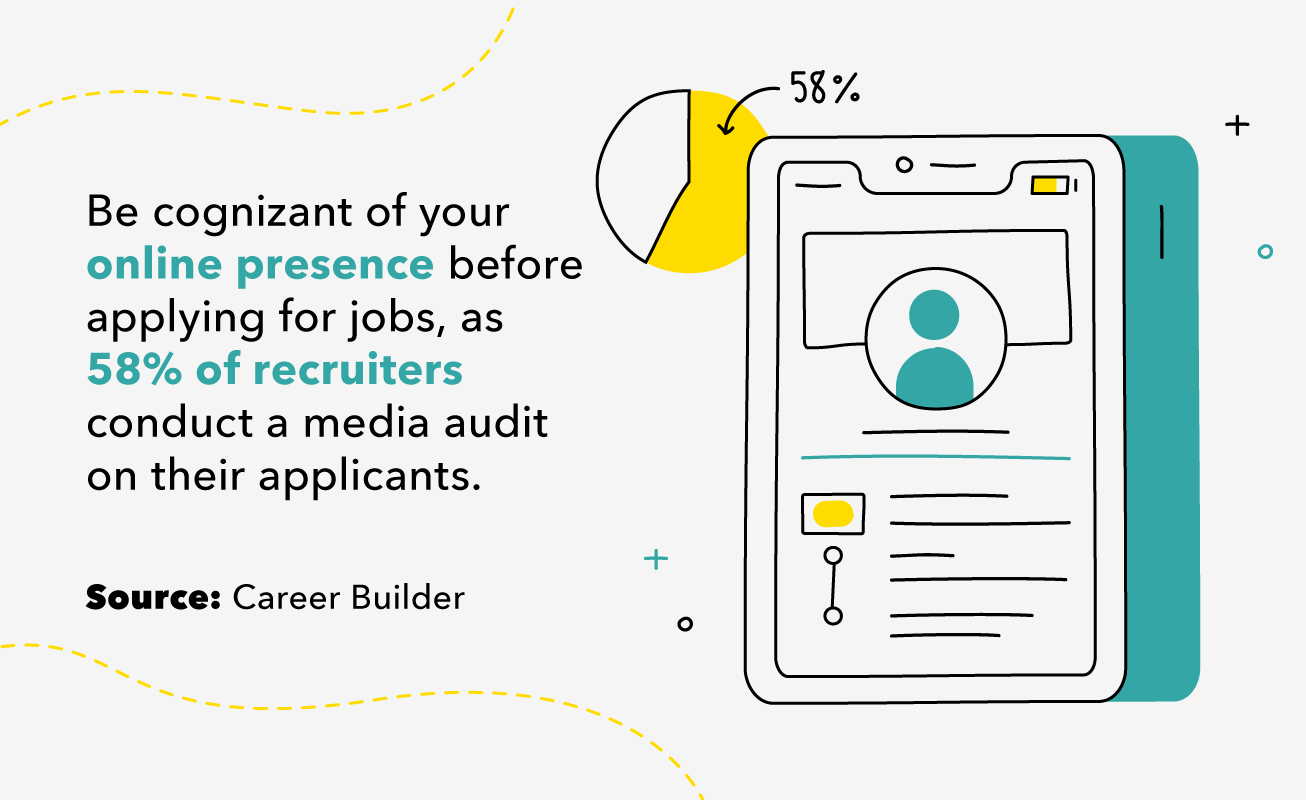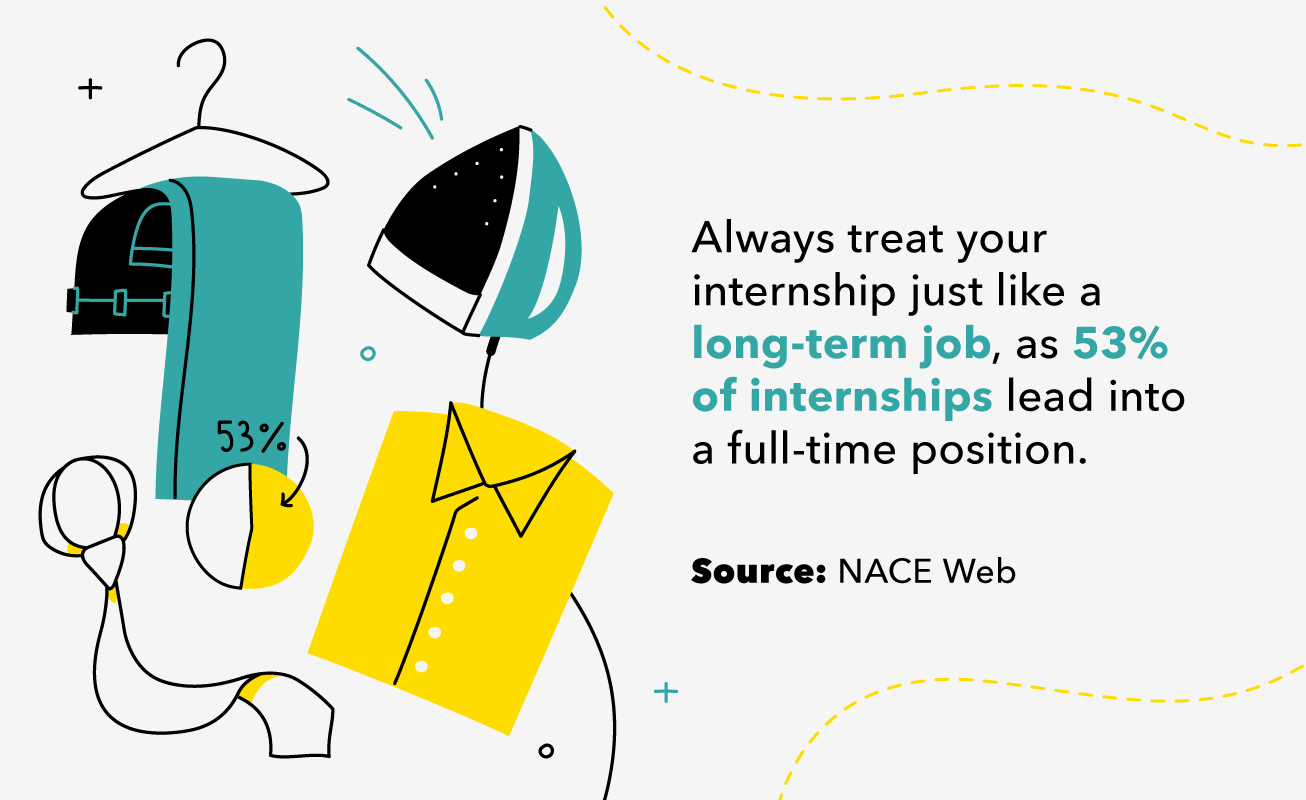If you’re a current college student, you may find yourself wondering what your career — and budget — will look like after you get your diploma. Will the hours spent studying all prove worth it? Internships can be the perfect opportunity to discover your passions, budget expectations, and future goals before accepting a full-time job.
COVID-19 has impacted students around the world, as well as the job market college graduates will be entering. Events, meetings, and learning opportunities have changed drastically from what we know as normal. Even though the landscape has changed this year, there are many companies still looking to hire.
Paid internships can be a great way for students to start thinking about money management, while building real life experience that’ll help them in the job market. Additionally, a study found that 81 percent of graduates said internships helped them pivot their career interests. Not to mention, internship experience could raise your post-college starting salary expectations.
Find an internship that fits your passion and your budget using our guide below! Jump to our infographic or keep reading for a full guide on how to land an internship that benefits you and your wallet.
- Where to Find Internships
- Tips to Applying to Internships
- Tips for a Successful Interview
- How to Make the Most of Your Internship
Where to Find Internships
Search for Jobs Online
Job hunting can be a grueling process. There are various titles, job descriptions, and opportunities available in each industry. Start out your search focused on what you’d like to do after college, then broaden your search to related titles and industries. With that in mind, sign up for the top job-posting websites. Some resources to check out include:
As only 27 percent of college students get jobs related to their majors, it’s important to cast a wide net. Internships are designed for students to dip their toes in the water and see what their options are.
While sifting through your top choices, double check their compensation rates to estimate the impact on your budget. If the postings don’t say if they pay, do more research. There are online resources like Indeed or Glassdoor that can give you a better idea.
Use Campus Resources
Use the wide array of resources available on your college campus to find an internship that’s right for you. Visit your career center’s online job posting board to see what opportunities await. If you don’t find exactly what you’re looking for, reach out to your career center staff. They may be able to help you locate a paid internship in your area.
Another great way to find internship leads is to attend campus career fairs. Set a goal to visit one or two in-person, or virtual, events per semester to grow your network. You may stumble upon an opportunity specific to your college’s expertise that you wouldn’t have found otherwise. Check out our top ways to utilize your school’s career center:
- Visit your college career center monthly.
- Speak with professionals within your major.
- Attend at least one or two career fairs per semester.
Connect through Networking
Before you’re ready to amp up your job search, actively grow your network. Connect with your classmates and university staff at job fairs or networking events. This could mean meeting others at virtual or in-person events, or connecting over LinkedIn.
If you’re feeling ambitious, reach out to industry leaders about scheduling informational interviews. Send them a few dollars for coffee or lunch while you ask questions over video chat about getting an internship, or getting in a specific career. Write down their expert tips to ensure you make your internship experience successful. Additional ways to grow and leverage your network:
- Attend one to two campus networking events to meet industry professionals in your area.
- Schedule informational interviews for no more than 15 minutes to be cognizant of their time.
What to Do Before You Apply
Now that you may know the industries and companies you’d like to apply to, it’s time to make it happen. Set up your resume and cover letter strategically. Get noticed using our top application tips below.
Find the Right Time to Apply
Applying for a job can be nerve-racking and time consuming. On average, it takes someone five months to find a job. You may apply to numerous internships before finding the right fit. If you want a paid summer internship, apply months in advance to stay on track with your summer budget goals.
In most cases, it is recommended to apply at least six months prior to your potential start date. While some internships are arranged a couple of months before the start date, they may not be paid. If you’re looking for a paid summer internship, keep an eye out for openings starting in October.
Clean Up Your Online Presence
Many recruiters do a media audit on their applicants. They’re looking to get a better representation of who you are and what you’re interested in. Ensure your profiles are up to date and showcase your skills and expertise.
If you don’t want your personal accounts to be seen, put them in private mode. Even consider having two accounts — one for work and one for personal use. When you go to turn in your resume online, embed your professional media links, like your LinkedIn or Facebook, into your resume.
Diversify Your Efforts
When applying for paid internships, you’ll likely be competing against many qualified applicants. Set yourself apart by diversifying your skillset to show you’re ready for new and unique challenges. Explain your educational journey through the many accomplishments you’ve reached similar to these:
- Leadership positions (president of a club or designated project leader).
- Interesting hobbies (photography, sports, or art projects).
- Measurable side projects (starting your own website or YouTube channel).
Shed light on your proudest class projects along with your best scores and feedback you earned. Focus on your communication and teamwork skills. As these are key skills recruiters are looking for, adding these to your resume could add an extra boost.
Tailor Your Resume and Cover Letter
As you have a broad idea of your strengths, skills, and achievements, it’s time to put it on paper. Organize your college, career, and accrued skills experience and achievements into different sections. Add any numerical values associated to your accomplishments when you can. For example, add your project test scores or your overall amount of yearly academic projects you’ve completed. This gives recruiters an idea of how you could be an asset, and the earnings they may offer you.
Organize your test scores and top skills grouped by theme. Use active verbs when you list out the projects you’ve worked on. If you’re in a club on campus, list out what you’ve worked on and the positive feedback you’ve received.
On your cover letter, showcase your genuine interest in the company. Highlight their mission statement and values. Then, prove to them why and how you align with their mission. Take a deep dive into their media accounts and website to highlight any other key findings. They’ll appreciate the extra research you put in to get to know their company.
Re-Read the Application Instructions
After you’ve put in all the hard work of creating a polished resume, you don’t want it to go to waste by clicking the wrong button. Read the application guidelines before creating your resume and re-read them before submitting your application. This will demonstrate your outstanding attention to detail and value as a paid intern.
Many companies even have pre-application screening exams. If they allow you, read the instructions a few times before starting. You may be timed and may not be able to go back to re-read before starting your exam.
How to Have a Successful Interview
You’ve put in the hard work, and now it’s time to schedule an interview. While you may have a call back and a meeting marked on the calendar, that doesn’t mean you won the job. It’s time to break out your notebook and perfect interview questions just like your budget.
Research the Company Thoroughly
First things first, research the company you’re applying for. This shows the hiring manager that you’ve done your homework. Fully understand what they do, how their company got started, and ways your skills could benefit them. The more you prove your worth, the more your earning potential could increase.
While researching, brainstorm questions to interview your interviewees. If they’ve told you how many people are attending your interview, and who those individuals are, leverage that information. Go on LinkedIn, visit their company employee page, or simply Google their names. Figure out how each individual impacts this company and questions you want to ask them.
Practice Common Interview Questions
After you’ve done your research, it’s time to start practicing for the interview. There are many free online resources that list out the top questions recruiters ask and why. Print out sheets of questions, write out your responses, and practice them until perfect.
Take it upon yourself to research industry-specific interview questions and then schedule mock interviews with your friends and professionals at your college’s resource center. They can provide expert advice on how to build your responses and what salary rates to expect.
Dress the Part
Thirty-seven percent of interviewers reported appearance and style as a key differentiator when deciding if someone is fit for the job. Dress like a professional whether your interview is scheduled over video, or in person. Keep in mind, your interview attire may differ between industries. Research the company’s website and media accounts to see how formal their workwear may be. If you still don’t find a clear answer, call the HR department to ensure you pick the right pieces.
Present your best self to nail your first impression. Dress in comfortable clothing that fits you properly. Make sure to steam your wrinkled clothes and buff your leather shoes to prove your attention to detail.
Master Your Body Language
It takes just three seconds to make a good (or bad) impression. Interviewers are analyzing how you carry and represent yourself from the very beginning. To make your interview more impactful, exude confidence by maintaining eye contact and avoid fidgeting.
Always sit up straight and keep gesturing at a minimum. Smile and nod when it feels right to show your genuine interests in the conversation. Don’t forget to thank them for their time!
Send a Thoughtful Follow-Up
You may have already said thank you while exiting your interview, yet there’s no harm in saying it again! Show your gratitude for this opportunity by following up with a thank you note. You could send it via email or as a handwritten note within 24–48 hours after your meeting.
Even though emails may be easier, handwritten cards have more of an impact. Go out of your way to purchase and send a thank you to everyone you came in contact with. That could be the receptionist for giving you water, or the CEO for interviewing you.
How to Make the Most of Your Internship
So you got the internship and you’re eager to hit the ground running, but there are some strategies to consider before stepping into your first day. As this may be your first internship, you want to make the most of it. Paid internships are the perfect opportunity to find a mentor, build your career, and invest in your financial portfolio.
Impress from Day One
Now’s your time to shine — show up in style and showcase your skills. As 53 percent of internships lead to full-time positions, show up ready to work. Invest your time in others, and companies may want to increase their investment in you. Get started on the right foot by using our tips below:
- Ask your new team about their office attire preferences.
- Show up at least 15 minutes early your first day in case you get lost.
- Research your team and make a list of questions you would like to ask.
- Go around the office and meet at least two new people per day.
- Always be enthusiastic and positive.
- Ask for help when you’re unsure about a task or project.
Find a Mentor
As you adapt to your new internship, go out of your way to establish long-lasting business relationships. Make a plan to meet up with someone different in the office each week. You could ask to go to coffee, lunch, or get to know each other during breaks. While building your network, see which connections grow into natural mentorships. These connections can help guide you throughout your career and level up your salary potential.
Grow and maintain your networking with these four tips:
- Actively connect with others to build your professional portfolio.
- Enjoy a coffee break while getting to know your team outside of the office.
- Keep an eye out for expert tips to build your career and your budget.
- Find one or two long-lasting career mentorships.
Leverage Your Network
Eventually your internship will end, but there may be an opportunity to return post-grad. Whether or not you plan to return, show your team how appreciative you are for the opportunity with a gracious exit. Leaving on good terms could earn you a job in the future, or help you build out your reference list.
Here’s how to say goodbye in style:
- Attend one to two campus networking events to meet industry professionals in your area.
- Ask your workplace mentors to exchange email addresses to stay in touch.
- Add a reminder to your calendar to email your mentors every three months.
Getting an internship can help pave the way for your dream career and budget. You’re able to uncover what you love and what you may not. You’re able to build your career portfolio while building your financial portfolio. Keep reading to check out our seven tips to earning and progressing in your internship.

Sources: Top Resume | ZipJob | SHRM | Internships | NACE 1, 2, 3, 4 | Indeed | Career Builder
The post How to Land an Internship that Pays: Your Ultimate Guide appeared first on MintLife Blog.




